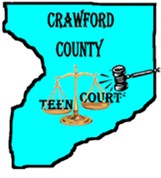Crawford County Teen Court

Teen Court Youth Volunteer Application (In PDF format)
Crawford County Teen court is an alternative sanctioning program for first-time youth offenders who agree to allow their peers to determine sentencing instead of the juvenile justice system. Through youth participation, the program’s goal is to decrease and discourage juvenile delinquency by intervening in the beginning stages of criminal behavior. Unlike any other diversion program in Crawford County, Teen Court serves a range of youth within its peer sanctioning process, such as teens needing a second chance or youth looking for an opportunity to serve their community as jurors.
What should first-time juvenile offenders and parents expect from this program?
- The parent/guardian must participate in a pre-trail intake interview with the Teen Court Coordinator.
- The juvenile and parent/guardian must appear for the hearing and accept the sanction imposed by the teen jury.
- If the participant fails to complete any part of the sanctions in a timely manner, the case will be transferred back to the referring agency or court system.
Who is Eligible?
Teen Court serves youth ages 12-16 who commit first-time misdemeanor crimes or ordinance violations, such as:
- Curfew
- Disorderly Conduct
- Harassment
- Meddling/Minor Property Offenses
- Possession of drug paraphernalia
- Possession of marijuana – personal use
- Shoplifting – retail theft under $100
- Simple truancy (age 12-17)
- Underage Tobacco
- Any other violation or age the Court or other agencies feel appropriate for Teen Court
Youth must admit guilt to the offense. Youth must also pay a $35 fee and be willing to participate in Teen Court.
Youth must have a parent or guardian who is willing to accompany them to Teen Court.
Any restitution owed to victim(s) must be paid through this program.
Youth must agree to comply with the Teen Court Jury’s sentence and rules.
Common Sentencing Options
- Serve jury duty on Teen Court
- Community Service
- Provide oral/written apologies to victim(s) and/or parent(s)
- Write an essay
- Pay restitution (if applicable)
- Other as seen fit by Teen Court
Volunteering for Teen Court
Youth Volunteers
Become a youth volunteer: teens can participate in many different aspects of teen court. You learn how the judicial system works and gain a beneficial hands-on experience showing the reality of what happens in a courtroom. To become a youth volunteer, contact Erica Krachey at 608-326-1187 or email Erica.Krachey@WIcourts.gov.
Adult Volunteers
Adult volunteers provide guidance for our teen court youth, impacting their future and our community in a positive manner. This is a rewarding volunteer experience that will make a difference in the life of a young person and set a positive example for them. For more information about the Teen Court program, contact the teen court coordinator, Erica Krachey, at 608-326-1187 or email Erica.Krachey@WIcourts.gov.
Who Benefits from Teen Court?
Juvenile Offenders who successfully complete their Teen Court sentence will have their charge dismissed. Youth are also given an opportunity for a REAL second chance, a chance to turn mistakes into positive choices.
Parents of the Offender are no longer held totally accountable. The juvenile offender becomes responsible for his or her own behaviors and actions.
The Community receives the benefits from projects and community service work. Citizens are able to see teens being held accountable for their actions.
Youth Volunteers serve as positive role models and gain a sense of responsibility as they encourage peers to stop behaviors that negatively reflect on other teens. They also get a chance to participate in the juvenile justice system and examine possible career opportunities.
Adult Volunteers are given the opportunity to make a difference in the lives of young people.
Crawford County Teen Court Mission Statement
The mission of the Crawford County Teen Court program is to assist teen offenders in assuming responsibility for their illegal behavior; to use positive peer influence, respectful dialogue, and relevant sanctions in an effort to increase a sense of community and to promote responsible behavior.




